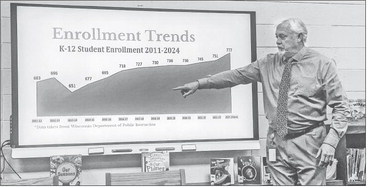Marathon admin spells out impact of referendum


By Kevin O’Brien
Voters in the Marathon School District will need to decide in November if they are willing to pay more in taxes in order to maintain the quality of programs, staff and facilities they’ve come to expect at local public schools, superintendent Rick Parks told a small group of residents at an informational session last week Wednesday.
“We want to provide so our students succeed. That’s all we’re trying to do,” Parks said to a group of less than 10 district voters gathered at the Marathon Area Elementary School library.
In August, the school board voted to put a referendum question on the Nov. 5 ballot, asking voters to approve a $1.6 million increase in the district’s revenue limit on a recurring basis. The additional money will be used to cover a variety of operational expenses, including staff for a growing student population and replacing three sections of roof on the district’s two buildings.
At last week’s hearing, Parks said passing the referendum would add 13 cents to the district’s mil rate, bringing it to $7.92 per thousand dollars of property. This would equate to $13 on a $100,000 home. If the referendum does not pass, next year’s mil rate would be $5.22 or, if the board decides to put more money into defeasance to pay down debt, it would be $6.37.
Parks said the more important number is the total property tax levy, which is projected to increase from $4.8 million to $4.9 million in 2024-2025 if the referendum passes.
“We can say that your tax bills aren’t really going to skyrocket or jump,” he said. “That’s not what it’s about. It’s trying to maintain things and cast us forward for more years on an even path.”
One resident in attendance, however, said the resulting tax increase would be significant for many taxpayers, including himself. He said he understands the district’s needs, but
See REFERENDUM/ page 2
Rick Parks Referendum
Continued from page 1
he would rather see a drop in his tax bill, which could happen if the referendum fails in November.
“I’m in agriculture. Where do I turn?” he wondered. “My commodities are going down, below cost.”
Earlier in the meeting, Parks said the district’s mil rate would drop significantly if the referendum did not pass – about $200 less per thousand dollars of property value – but it would also leave the district about $1 million “in the hole” by the end of the school year. This would cut into the district’s fund balance, which would drop into the negative by 2027, and it would also lead to tax bills spiking in future years.
“We are trying to make our tax levy as predictable for all of our taxpayers, so that we don’t have the highs and the real lows,” he said.
Parks spent the first part of the hearing explaining how the district meets its financial needs through a combination of state aids and local property taxes, which equal the district’s revenue limit when added together. These numbers are based on three main factors: the three-year rolling enrollment average, the district’s property values and the amount spent in previous years.
The last time the district passed a referendum was in 2018, which included $4.3 million for additions at the MAES/Marathon Venture Academy and the high school, plus a $685,000 recurring increase in the revenue limit for operational expenses. Because the federal government provided school districts with additional money to cope with the COVID pandemic, Marathon has been able to stretch its 2018 referendum dollars longer.
“We thought it would go five years. We actually got six years out of it,” Parks said. “Being really honest with you, we could get another year out of it, but the election cycle is such, it puts us into a predicament of a potential pretty big drop and than an ask for a pretty big raise.”
With the cost of nearly everything increasing and the school board needing to hire more staff due to increasing enrollment, the district is starting to see red numbers in its financial projections.
“Everything has gone up and we’re trying to keep things relatively the same, and when we can, put a little money into fund balance,” Parks said. “This year we couldn’t. We’ve got over $200,000 coming out of fund balance to help us balance.”
Since the 2018 referendum was passed, the district’s enrollment has increased from 730 to 777 as of last school year, with many of those new students coming in from inside the district as opposed to open-enrolling in. In response, the school board has hired a number of new staff members, including additional teachers at both MAES/MVA and the high school, an associate principal at MAES/MVA and a second mental health counselor.
“We’re doing, I believe, a good job with the staffing levels to meet the needs of all of our kids,” Parks said. “We could raise class sizes. That’s possible. I just personally don’t believe that’s the best for the kids.”
When it comes to students who open-enroll into Marathon from surrounding districts, Parks said the district currently gets about $8,800 per pupil from those districts – which is only two-thirds of what the district receives for resident students. The open enrollment revenue is enough to cover the cost of additional staff but it does not help with the district’s ongoing facilities needs, he said.
Though the district has replaced all of its water heaters, furnaces, and light fixtures since 2008, Parks said it’s still looking at having to replace three sections of roof, at a total estimated cost of $1.1 million. He said this cost could be covered by the general fund if the referendum passes.
Given the district’s burgeoning enrollment and desire to keep class sizes low, a couple residents at the hearing urged district officials to minimize the number of open enrollment students. Parks said the school board already did that in January by setting the limits at zero in every grade except four-year-old kindergarten, first and ninth.
“We’ve basically turned off the spigot,” he said.
If the referendum were to pass in November, Parks said the board may not need to levy the full $1.6 million every year if state aid increases in the future. At the same time, he said the extra spending authority will “absolutely satisfy our needs for at least five years.”
“I’m not here to convince you,’ he said. “I’m here to inform you.”
GOING UP - Superintendent Rick Parks points to a graph showing the steadily rising enrollment in the Marathon School District, which includes a mix of both resident students and those open-enrolled in from other districts. STAFF PHOTO/KEVIN O’BRIEN




